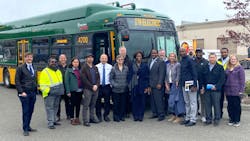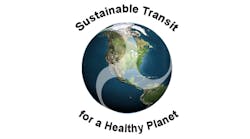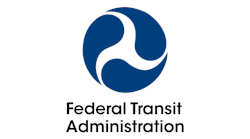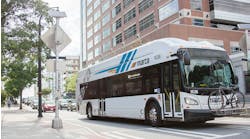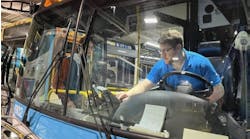The U.S. Department of Transportation's (USDOT) Federal Transit Administration (FTA) took the occasion of Earth Day on April 22 to recognize 10 transit agencies that have worked to reduce greenhouse gas (GHG) emissions through the department’s Sustainable Transit for a Healthy Planet initiative.
The awards were given in eight categories including most accomplished, most ambitious, most collaborative, most equitable, most innovative, most transformative, First to the Finish and Champions of the Challenge.
"By helping people efficiently and affordably get where they need to go, public transit plays a key role in reducing greenhouse gas emissions" said U.S. Transportation Secretary Pete Buttigieg. "We’re delighted to honor these 10 public transit agencies leading the charge to protect our communities against climate change."
Awardees across the eight categories include:
- Most Accomplished: Antelope Valley Transit Authority in Lancaster, Calif., met its 100 percent electric fleet goal, the first agency to achieve this feat in North America.
- Most Ambitious: Los Angeles County Metropolitan Transportation Authority set a goal that exceeded President Joe Biden’s goals of a 50 percent reduction in GHG emissions.
- Most Collaborative: Iowa City Transit successfully leveraged state, local and private partnerships to advance its climate action strategies.
- Most Equitable: King County Metro in Seattle, Wash., developed a plan focused on addressing climate change impacts and transportation access in underserved communities.
- Most Innovative: Champaign-Urbana Mass Transit District in Champaign-Urbana, Ill., demonstrated the use of creative solutions to implement its climate action strategy.
- Most Transformative: Sound Transit in Seattle, Wash., developed a plan demonstrating sustainability throughout the agency, including fleets, facilities and operations.
- First to the Finish: Metropolitan Transit Authority of Harris County in Houston, Tex., was the first to submit its new climate action plan, delivered on Feb. 4, 2022.
- Champions of the Challenge: This award was bestowed on small, medium and large transit agencies that developed plans that include achievable, ambitious strategies for reaching their GHG emission reduction goals:
- Capital Metropolitan Transportation Authority, Austin, Texas (large)
- Central Ohio Transit Authority, Columbus, Ohio (medium)
- Rockford Mass Transit District, Rockford, Ill. (small)
"Transit agencies across the country are greening their fleets, hardening critical infrastructure and transitioning their workforces to reduce the disproportionate impacts of a warming climate on their communities," said FTA Administrator Nuria Fernandez. "We know that transportation is responsible for more greenhouse gases than any other industry. Transit is one of the keys to changing that, addressing the climate crisis by taking cars off the road and electrifying vehicles nationwide. Through the Climate Challenge, FTA is working to make transit even greener."
FTA’s Climate Challenge was created in June 2021 to advance the Biden Administration’s GHG reduction goals. The Climate Challenge called on transit agencies to develop strategies to reduce emissions, such as converting fleets to electric buses, making facilities more energy efficient and generating power through renewable energy sources. A total of 171 transit agencies signed on to participate in the Climate Challenge with FTA assisting participants throughout the year to advance their goals with technical resources, targeted listening sessions and peer exchanges.
The second phase of the Climate Challenge has launched and seeks to increase participation. Phase Two will focus on electrification or zero-emission transition plans to achieve the president's GHG emissions goals. Agencies can sign up for Phase Two at FTA’s website.
